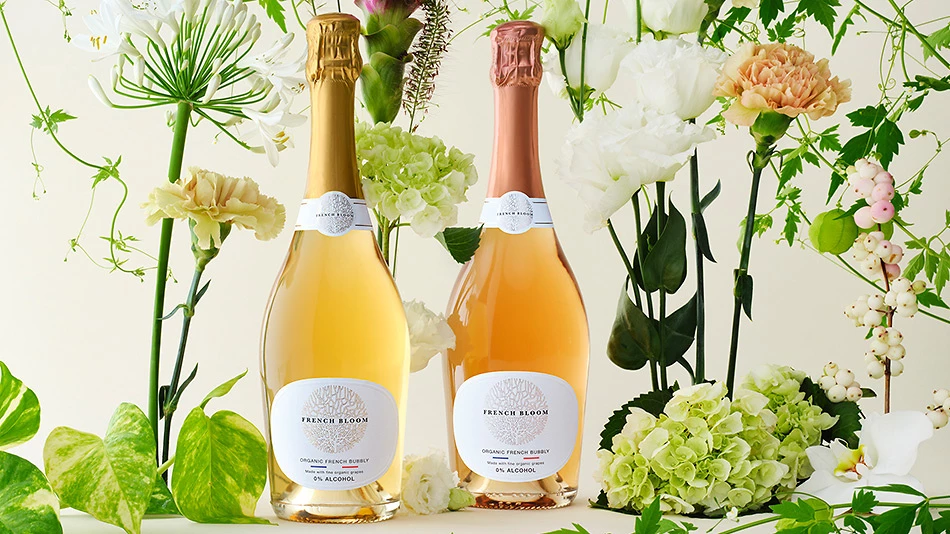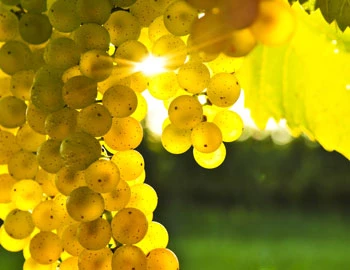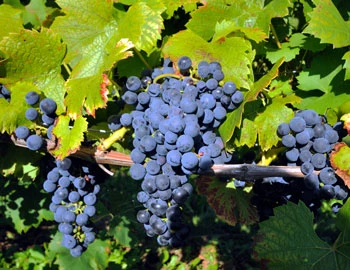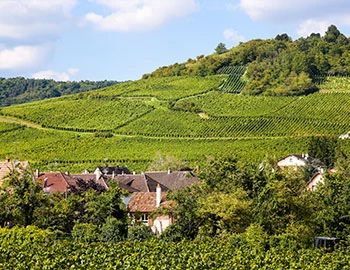French Bloom Le Rosé
Frankreich, French Bloom, 750 ml

| Grape variety: | Chardonnay, Pinot noir |
| Producer: | French Bloom |
| Origin: | France |
| Other bottle sizes: |
Description
Champagne-worthy enjoyment without any alcohol! For us, the best de-alcoholised sparkling wine on the market! Le Rosé exudes a true floral bouquet and oscillates on the palate with its balanced complexity between minerality and freshness. The elegant rose petal flavours, notes of fresh wild berries and white peach marry with the lively acidity, which is accompanied by a fine sweetness. French Bloom Le Rosé is ideal for brunch and a romantic dinner. An excellent accompaniment to fish! Also suitable for pregnant or breastfeeding women.
Organic French Bubbly, French Gensac sparkling water, organic white grape juice, de-alcoholised organic wine, organic lemon juice, natural grape flavouring grapes. Nutritional information (100 ml): Energy 19 kcal / 80 KJ, carbohydrates 4.7g, of which sugar* 4.2g, proteins 0g, fats 0g, saturated fats 0g, salt 0g *Contains naturally occurring sugars in the fruit.
New in our range: French Bloom non-alcoholic sparkling wine from France

French Bloom Le Blanc and Le Rosé: French organic sparkling wine 0.0% alcohol with a perlage worthy of champagne!
Attributes
| Origin: | France |
| Grape variety: | Chardonnay, Pinot noir |
| Label: | Vegan, Certified organic or biodynamic wine |
| Ripening potential: | 1 to 2 years |
| Drinking temperature: | 6 to 8 °C |
| Food Pairing: | Apéro pastries, Apéro riche, Grilled fish, Baked egli fillets with tartare sauce, Sushi, Sashimi, Ceviche |
| Volume: | 0.0 % |
Chardonnay
King or beggar?
Hardly any variety of vine shows such a broad spectrum of quality as the Chardonnay. Its wines range from faceless neutrality to breath-taking class. It is an extremely low-maintenance vine, which explains why it is grown around the world – even in places where it probably should not be. The aromas of the Chardonnay variety are not very pronounced: a bit of green apple, a little hazelnut; in warmer latitudes, also melon and exotic fruits. The wines are often defined by maturing in casks. They develop more or less subtle notes of butter, toasted bread and vanilla. The grapes achieve their highest expression in their region of origin, Burgundy. Its heart beats in the Côte de Beaune: one might think of the plant growth of Meursault or Puligny-Montrachet. With their finesse and complexity, they can survive for decades. Chardonnay also achieves first class in some Blanc-de-Blancs champagnes. It additionally yields great wines in the Burgundian Chablis, and increasingly in Australia and Chile. A simple rule of thumb for pairing with food: When butter and cream are involved, you cannot go wrong with Chardonnay.

Pinot noir
Blueprint of the terroir
No other variety expresses its terroir as precisely as Pinot noir. It is a sensitive, fragile grape. But when it succeeds, it gives the world some of its very greatest wine plants. It especially excels in Burgundy, where it has been cultivated for at least 700 years. Even in the middle ages, it was considered so precious that it was kept separate from other grapes so as to not diminish its value. The finest examples are delicate and fragrant with aromas of cherries and red berries. With maturity, notes of forest floor, leather and truffles enter as well. An irresistible fruity sweetness still shines through, even after several decades. The Pinot noir does well in cool locations: in Switzerland and in Germany, where it is known as Blauburgunder and Spätburgunder respectively; in Alsace and in South Tyrol, in Oregon, New Zealand and Tasmania. Not least, it yields fantastic champagnes. It is a wonderful culinary companion. With its soft tannins and charming bouquet, it meshes with everything, from Güggeli and cheeses to fried fish.

France
France – Philosophy in a bottle
According to French philosophy, wine should be an expression of the soil and climate. They use the word “terroir” to describe this. Terroir makes every wine different, and many especially good. French wine is regarded worldwide as an expression of cultural perfection. The French believe that humans are responsible for the quality of the berries, the vine variety for their character, and nature for the quantity. This philosophy can be expressed succinctly as: “the truth is the vineyard, not the man.”



